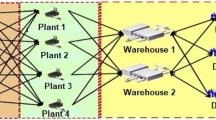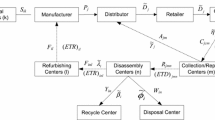Abstract
While improving the operational efficiency of the enterprise, the logistics supply chain directly or indirectly affects the performance of the enterprise because of its own and external uncertainty, resulting in tangible or intangible losses. In this era of rapid change and increasing competition, reducing the impact of uncertainty can reduce the risk and vulnerability of the entire logistics service supply chain, and can gain or maintain a competitive advantage. Therefore, based on the background of supply and demand uncertainty, this paper establishes the fuzzy integrated optimization model of logistics supply chain system by using LR fuzzy numbers. In order to solve this model, the study carried out deterministic processing and transformed it into a deterministic multi-objective linear programming model. At the same time, this study also designed a genetic algorithm to solve the model, in order to solve the choice of potential supply and demand uncertainty in the system, and achieve the global optimization of the network. Finally, the calculations are carried out by numerical examples. The results prove the effectiveness of the model and algorithm.


Similar content being viewed by others
References
Uygun Ö, Dede A (2016) Performance evaluation of green supply chain management using integrated fuzzy multi-criteria decision making techniques. Comput Ind Eng 102:502–511
Kannan D, Khodaverdi R, Olfat L et al (2013) Integrated fuzzy multi criteria decision making method and multi-objective programming approach for supplier selection and order allocation in a green supply chain. J Clean Prod 47:355–367
Kuo RJ, Chen CH, Hwang YC (2001) An intelligent stock trading decision support system through integration of genetic algorithm based fuzzy neural network and artificial neural network. Fuzzy Sets Syst 118(1):21–45
Prakash C, Barua MK (2015) Integration of AHP-TOPSIS method for prioritizing the solutions of reverse logistics adoption to overcome its barriers under fuzzy environment. J Manuf Syst 37:599–615
Zhou Q (2018) Multi-layer affective computing model based on emotional psychology. Electron Commer Res 18(1):109–124. https://doi.org/10.1007/s10660-017-9265-8
Zhou Q, Luo J (2017) The study on evaluation method of urban network security in the big data era. Intell Autom Soft Comput. https://doi.org/10.1080/10798587.2016.1267444
Zhou Q (2016) Research on heterogeneous data integration model of group enterprise based on cluster computing. Clust Comput 19(3):1275–1282. https://doi.org/10.1007/s10586-016-0580-y
Govindan K, Khodaverdi R, Vafadarnikjoo A (2015) Intuitionistic fuzzy based DEMATEL method for developing green practices and performances in a green supply chain. Expert Syst Appl 42(20):7207–7220
Tang J, Zhang G, Wang Y et al (2015) A hybrid approach to integrate fuzzy C-means based imputation method with genetic algorithm for missing traffic volume data estimation. Transp Res Part C Emerg Technol 51:29–40
Azadi M, Jafarian M, Saen RF et al (2015) A new fuzzy DEA model for evaluation of efficiency and effectiveness of suppliers in sustainable supply chain management context. Comput Oper Res 54:274–285
Tavana M, Zareinejad M, Di Caprio D et al (2016) An integrated intuitionistic fuzzy AHP and SWOT method for outsourcing reverse logistics. Appl Soft Comput 40:544–557
Zhalechian M, Tavakkoli-Moghaddam R, Rahimi Y (2017) A self-adaptive evolutionary algorithm for a fuzzy multi-objective hub location problem: an integration of responsiveness and social responsibility. Eng Appl Artif Intell 62:1–16
Balaman ŞY, Matopoulos A, Wright DG et al (2018) Integrated optimization of sustainable supply chains and transportation networks for multi technology bio-based production: a decision support system based on fuzzy ε-constraint method. J Clean Prod 172:2594–2617
Liao CN, Kao HP (2011) An integrated fuzzy TOPSIS and MCGP approach to supplier selection in supply chain management. Expert Syst Appl 38(9):10803–10811
Mishra S, Sahu AK, Datta S et al (2015) Application of fuzzy integrated MULTIMOORA method towards supplier/partner selection in agile supply chain. Int J Oper Res 22(4):466–514
Zhou Q, Lou J, Jiang Y (2019) Optimization of energy consumption of green data center in e-commerce. Sustain Comput Inform Syst 23:103–110. https://doi.org/10.1016/j.suscom.2019.07.008
Zhou Q, Xu Z, Yen NY (2019) User sentiment analysis based on social network information and its application in consumer reconstruction intention. Comput Hum Behav 100:177–183. https://doi.org/10.1016/j.chb.2018.07.006
Zhou Q, Zhang Z, Wang Y (2020) Research on safety management system optimization of B2C E-commerce intelligent logistics information system based on data cube. J Intell Fuzzy Syst 38(2):1585–1592
Acknowledgements
The authors acknowledge the financial support of Changzhou Key Laboratory of Industrial Internet and Data Intelligence (No. CM20183002).
Author information
Authors and Affiliations
Corresponding author
Ethics declarations
Conflict of interest
The authors declared that they have no conflict of interest to this work. We declare that we do not have any commercial or associative interest that represents a conflict of interest in connection with the work submitted.
Additional information
Publisher's Note
Springer Nature remains neutral with regard to jurisdictional claims in published maps and institutional affiliations.
Rights and permissions
About this article
Cite this article
Li, Y., Yang, J. & Wang, Y. Optimization and system implementation of fuzzy integrated algorithm model for logistics supply chain under supply and demand uncertainty background. Neural Comput & Applic 35, 4295–4305 (2023). https://doi.org/10.1007/s00521-022-07135-2
Received:
Accepted:
Published:
Issue Date:
DOI: https://doi.org/10.1007/s00521-022-07135-2




